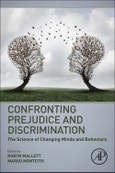Confronting Prejudice and Discrimination: The Science of Changing Minds and Behaviors focuses on confrontation as a strategy for reducing bias and discrimination. The volume tackles questions that people face when they wish to confront bias: What factors influence people's decisions to confront or ignore bias in its various forms? What are the motives and consequences of confrontation? How can confrontation be approached individually, through education and empowerment, and in specific contexts (e.g., health care) to yield favourable outcomes? These questions are paramount in contemporary society, where confrontation of bias is increasingly evident. Moreover, great strides in the scientific study of confrontation in the past 20 years has yielded valuable insights and answers. This volume is an essential resource for students and researchers with an interest in prejudice and prejudice reduction, and will also be valuable to non-academics who wish to stand up to bias through confrontation.
Please Note: This is an On Demand product, delivery may take up to 11 working days after payment has been received.
Table of Contents
I. Decisions to Confront Bias 1. Confronting intergroup bias: Predicted and actual responses to racism and sexism 2. The CPR Model: Decisions Involved in Confronting Prejudiced Responses 3. The decision to act: Factors that predict women's and men's decisions to confront sexism 4. When do groups with a victimized past feel solidarity with other victimized groups?II. Motives and Consequences of Confrontation 5. Goals Drive Responses to Perceived Discrimination 6. How lay theories (or mindsets) shape the confrontation of prejudice 7. Personal, collective, and group-distancing motives underlying confrontation of prejudice 8. Adolescents' Responses to Gendered Harassment and Discrimination: Effective Strategies within a School Context 9. Intersectional approaches to the study of confronting prejudice 10. The consequences of confronting prejudice: Confronter, confronted, and bystander perspectives
III. Approaches to Confrontation in Context 11. Navigating Successful Confrontations: What Should I Say and How Should I Say It? 12. Intervening to "break the gender bias habit." 13. Addressing Bias in Healthcare: Confrontation as a Tool for Bias Reduction and Patient and Provider Self-Advocacy 14. I disagree! Sexism is silly to me!" Teaching children to recognize and confront gender biases 15. From Pixels to Protest: Using the Internet to Confront Bias at the Societal Level








